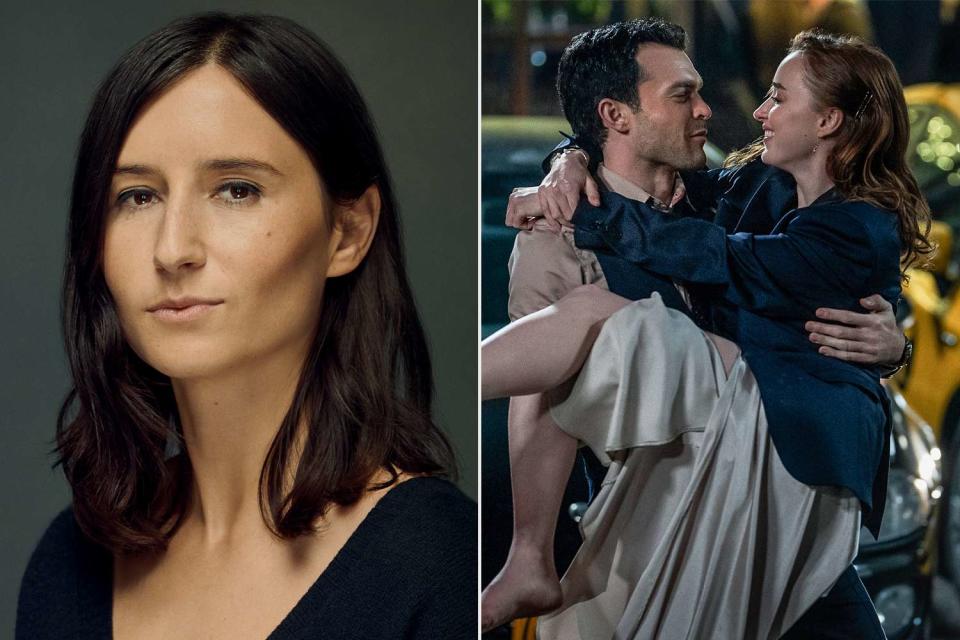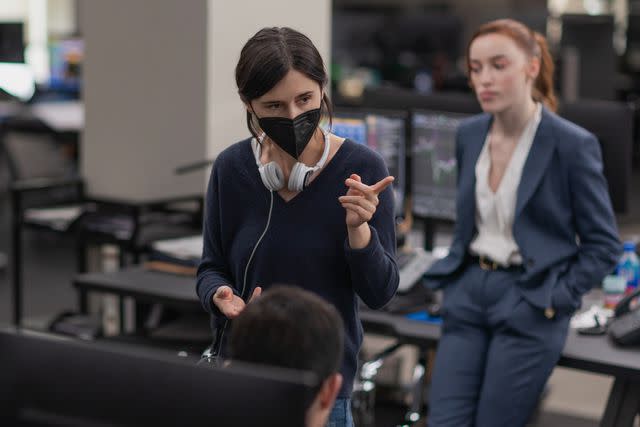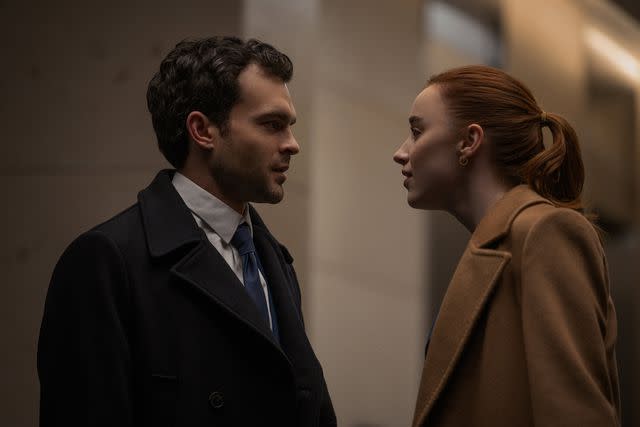“Fair Play ”Director Chloe Domont on Making 'Post-#MeToo' Thriller Personal: 'I Write My Fears' (Exclusive)
- Oops!Something went wrong.Please try again later.
'Fair Play' stars Phoebe Dynevor and Alden Ehrenreich reflecting "bats--- crazy" gender dynamic, its writer-director says

Sheryl Nields / Netflix; Sergej Radovic / Courtesy of Netflix
(Left) Chloe Domont (Right) Alden Ehrenreich and Phoebe Dynevor in "Fair Play"Chloe Domont is opening up about the all too real — yet “bats--- crazy” — inspirations behind her new film.
Fair Play stars Phoebe Dynevor (Bridgerton) and Alden Ehrenreich (Solo: A Star Wars Story) as a passionate couple who attempt to keep their personal relationship separate from their work at a cutthroat hedge fund firm.
A promotion that doesn’t go the way they expect upends their romance, revealing a toxic masculinity that audiences are sure to recognize, especially amid the ongoing reckoning of the #MeToo movement.
Although it’s a work of fiction, Domont, 36, tells PEOPLE the film was “15 years in the making” due to the real-life gender dynamics that informed it.
“This elephant in the room that no one could ever talk about,” the writer-director says, is that “a man's success is a win for the relationship. When it's the other way around, why is it a threat?”
Domont, who has also directed episodes of Billions and Ballers, opens up her debut feature film and how its story provided a painful but cathartic reflection of her experiences — both in personal relationships and a post-#MeToo Hollywood.
PEOPLE: The gender dynamics in Fair Play feel so specific and authentic. What — or, can we say, who — inspired you to tell this explosive story?
Chloe Domont: The real kernel came from this feeling I was having at a certain period of my life when my career started to take off. It was suddenly this feeling that I was having that my success didn't feel like a total win. It felt like a loss on some level. And it was because of the kinds of relationships I was in with men who adored me for my ambition, adored me for my talent, my drive, all my strengths. But at the same time, there was still this feeling that me being big on some level made them feel small.
It was never anything that was spoken about. It was just felt. And the way that I normalized that dynamic, the way that I started to undermine my excitement when I got certain jobs — this went on for years in different relationships and different shades of it.
It got to a point that became untenable for me, realizing how much hold these ingrained power dynamics still have over us, even in progressive cities and even with progressive men. So it's something that I wanted to put on screen and just go bats--- crazy with it.
The men that I was with, they would never want to admit that they were threatened by a woman. Because what would it say about them? And I would never want to admit that to my friends that I was with someone who was threatened by me on some level. Because what would that say about me?
It’s always bats---, never the quaint, safe experiences that make a good Hollywood movie?
No, no, never. Yeah… I wouldn't know how to make something or write something that I didn't feel on a deep level. I write my fears. I write what terrifies me.
That's always been an outlet for me. The cathartic part of it is that you take some incredibly personal, but you put it in a different world with different characters. It's the combination of the personal element and putting it against new territory that makes it a little bit more cathartic because of that separation.
Related: Alden Ehrenreich Says Ray Liotta 'Loved' Working on 'Cocaine Bear': He Had a 'Ball'

Slobodan Pikula / Courtesy of Netflix
Chloe Domont directing "Fair Play"Phoebe Dynevor and Alden Ehrenreich give riveting performances here. What was working with them like?
They're the heart and soul of the film. It's funny, someone said to me a few months ago, "It must be hard as a director when you have the best version in your head and then you don't get that version." And I'm like, "Man, what are you talking about?" If you cast right and you have the right people around you, the right collaborators, it takes the best version you have and it becomes something you never even thought of because of what other people bring to it.
The level of humanity that these two actors brought to it, the duality of emotions — I just feel like that is what makes us human. It's not when we feel one thing. It is that we feel opposing things that are completely contradicting to each other. This idea of wanting to love someone and hurt them at the same time. This idea of wanting to support someone, but also wanting to top them and the opposing feelings of jealousy and love.
What moments during filming surprised you most? How did Phoebe or Alden elevate it to that best version?
Things that they brought that surprised me in moments were just the pain — the pain and the internal struggle that Alden brought to this role, to Luke. He's someone that is deeply struggling with what he's feeling. He's not happy about it. He's struggling with it, but he doesn't know how to deal with it because he doesn't know how to talk about it because he can't even confront it. And that's why it becomes a poison that comes out in really ugly ways.
If you're willing, could you talk about how the finance world in this film reflects Hollywood or your experiences in the industry?
I mean, I think being a woman in any industry, you face this. That's why so many women have come up to me at the end of the film and said, "I've never felt so seen before," because of what they face, these kinds of challenges in the workplace, but also behind bedroom doors. And there's a reason that I wanted to explore that kind of toxicity in the workplace at the same time when she's experiencing that kind of toxicity at home. Because those things are quite parallel, especially if you are a woman who wants your piece of the pie.
So this story could have been told in any industry?
I really believe it could have. The reason why I chose high finance is I could relate to the life-or-death stakes that you feel in a work environment. That feeling in finance is very similar to the high stakes that you feel in film and TV. There's a lot of money on the table and if you don't make your day that costs hundreds of thousands of dollars.
That feeling and that adrenaline rush, I think, is quite actually similar to finance. So I felt like I could emotionally tap into what it's like to be in that environment even though I had never worked in finance.

Sergej Radovic / Netflix
Alden Ehrenreich and Phoebe Dynevor in "Fair Play"Where would you say this film factors into or reflects the #MeToo movement?
This is a film for the post-#MeToo era. Are we asking the same questions that maybe we were asking a while ago? In some ways, yes. And I think that's a problem.
In some ways, because we're in a post-#MeToo era, it's harder to talk about these things because no one wants to admit that that's really still going on. How can we work through some of these questions if some of us can't admit that we're still dealing with some of these ingrained gender dynamics? I feel like we're stuck because we don't know how to talk about it, because we're afraid to bring these kinds of things up.
Fair Play is streaming now on Netflix.
For more People news, make sure to sign up for our newsletter!
Read the original article on People.

